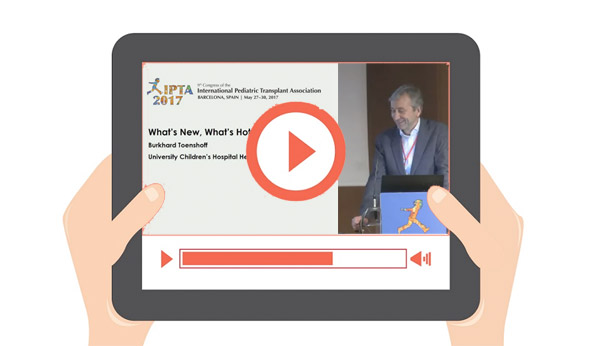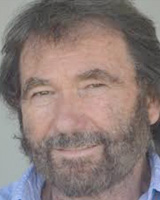
IPTA 2017 - Interview with Anne Dipchand
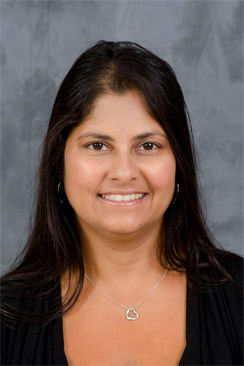
With the posting of the recorded presentations from IPTA 2017 our TTS staff caught up with Anne Dipchand, IPTA President, to give TTS members an overview of their recently held Congress in Barcelona, Spain.
TTS IHQ: Dr. Anne Dipchand, the recent IPTA Congress was a great success. Could you please provide us with a brief overview of the Congress?
Anne Dipchand: The 9th Congress of IPTA was incredibly successful and we are very proud of both the excellent scientific quality of the sessions and the excellent attendance of over 560 international delegates. We had 362 submitted abstracts from 39 countries and all of the talks from our 115 invited speakers were outstanding. The interactive workshops were very popular with incredible participation and positive feedback on the cutting-edge discussions that took place during those sessions. We also had very strong and well-attended Allied Health tracks throughout the Congress which we will to continue to foster as we move towards our Vancouver Congress in 2019.
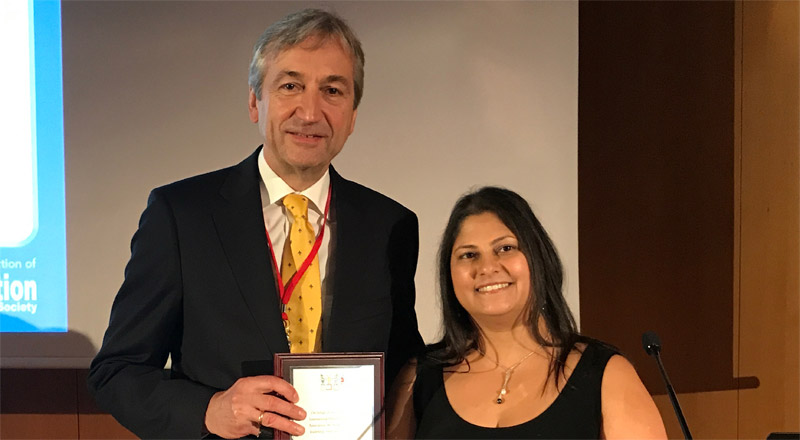
Passing of the torch: Burkhard Toensoff (IPTA President - 2015-2017) with Anne Dipchand (IPTA President - 2017-2019)
TTS IHQ: Are there any moments or presentations/sessions that stood out as memorable to you personally?
Anne Dipchand: I have to say the highlights of the meeting for me were the State-of-the-Art sessions, which included John O’Shea from the National Institute of Health; and Paolo de Coppi from the Great Ormond Street Hospital, London, who spoke on growing organs and the future of transplantation. The scientific quality of these lectures exceeded my expectations.
In addition, from a fun perspective, the social networking event at the Hospital Sant Pau on Monday evening was an evening full of history, culture and networking with old and new friends, which made the meeting that much more special for me.
TTS IHQ: Transplantation in pediatrics provides unique challenges both medically and psychosocially, especially as it pertains to your role as a caretaker of child patients who will transition one day into adult patients. Could you please provide an overview of these challenges to our readership who have an interest in Pediatrics?
Anne Dipchand: You’re correct in saying pediatrics is just the start of a long journey for these children and their families. There are a lot of unique medical needs, which were covered in depth during the Congress. However, the unique aspect of having a child who grows to be a young adult is what isolates pediatrics from the adult practice. We are very fortunate to participate in these children’s lives as they go through this transition and then actually transition them to our adult colleagues. This requires significant knowledge and expertise and we are very fortunate in IPTA to have the access to allied health professionals who participate in this important stage in medical, psychosocial and developmental changes for these children and their families.
I have to say that it is very special for us to participate in this part of care and though we are torn seeing them go, we know that it is a normal part of development. We are very lucky that for the most part we are able to keep in touch with these children and their families and see them through good times like university, weddings and starting families; but also continue to support them with the help of our adult medical teams when things do not go as planned.
 IPTA Council Meeting
IPTA Council Meeting
TTS IHQ: How can the larger transplant community contribute to IPTA, be it through membership or activities?
Anne Dipchand: There are many opportunities to participate in IPTA for the members of the medical community. There are a number of committees and initiatives that focus on the unique aspects of pediatric transplantation. We have a strong emphasis on outreach to areas of the world in order to meet our mandate of improving access to transplantation for children globally. We welcome anyone who would like to participate and help us advance our initiatives and mandates for children around the world.
One of the key things we like to focus on is the development of younger transplant professionals as they explore their career options. We like to invite them to attend our biennial Fellows Meeting which will be held in San Jose, Costa Rica in November 2018 (click here to be notified when more information is available; IPTA members will be notified automatically), where they can participate in small groups with established members of the transplant community to share both scientific work and mentorship as they approach the end of their training in transplantation.
TTS IHQ: Could you expand on IPTA’s role in mentorship?
Anne Dipchand: IPTA feels very strongly about mentoring young physicians, investigators and clinicians. We have a Fellow’s Meeting designed to bring together young transplant professionals in a small forum, in order for them to interact with senior investigators and clinicians in transplantation. As pediatric transplantation is such a small community and so specialized, it is important for young clinicians and scientists to gain exposure to it and be able to understand what difference they can make in the world and how satisfying a career in pediatric transplantation is.
We welcome the involvement of individuals who are exploring it as a career and who want further knowledge, mentoring and exposure. We also find that a number of young members, trainees and fellows are fostered to become involved in IPTA because of the involvement of their senior mentors in their own institutions. There are multiple ways for new members who are at a fellows level to become involved in IPTA and we are open to any other involvement suggestions and opportunities.
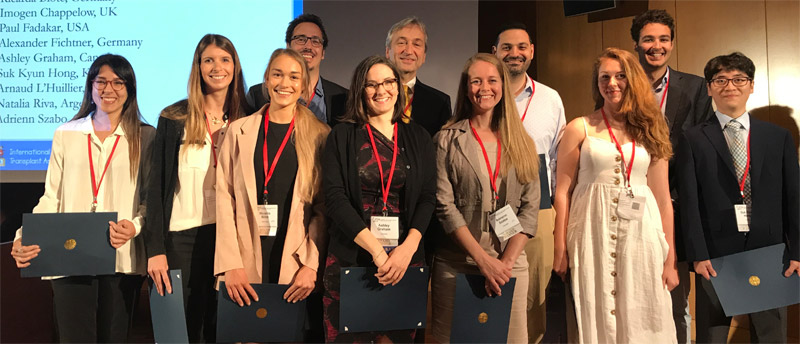
2017 IPTA-TTS Congress Scientific Award Winners (see list of recipients)
TTS IHQ: The TTS 2018 Congress will be held in Madrid and IPTA is providing significant contributions for the meeting with yourself as the Heart & Lung Track Co-Chair and Mignon McCulloch and Carlos Esquivel serving as Pediatric Co-Chairs. What would you consider a goal for these tracks or what would you say to delegates about their expectation of participating in these sessions?
Anne Dipchand: IPTA is very fortunate now to be a Section of TTS and we have only benefitted since we joined. With regards to the TTS 2018 Congress, even though we have our own meeting, it is important for us to participate and work together with TTS to advance the pediatric agenda. IPTA is well positioned to provide the outreach through TTS to raise awareness and share knowledge about pediatric transplantation to a much larger community of medical professionals.
With regards to thoracic transplantation, the numbers are small; however, it is an important part of the global transplant community. There are always challenges when we are talking about scientific meetings, with regards to people’s ability to attend given their alliances with other societies and their sense of value from what they are being exposed to at a meeting. The TTS Congress has been growing immensely and the contributions and offerings for thoracic transplantation have significantly expanded. We will build on that as we move toward the next TTS2018 Congress and invite our thoracic colleagues to explore the opportunities from a scientific perspective that are also applicable to their practice of transplantation.
TTS IHQ: Who or what inspired you to join IPTA?
Anne Dipchand: I think as I was beginning my career in pediatric transplantation, I was looking for a forum where I could share both scientific and academic experiences and knowledge, as well as develop some camaraderie and allegiances with like-minded people. I am also very interested in international medicine and outreach. IPTA provided a perfect opportunity, both from an academic and scientific perspective, to enhance my ability to make a difference in other parts of the world.
For more information about IPTA please visit www.iptaonline.org
About Anne Dipchand:
Anne Dipchand is President of the International Pediatric Transplant Association (IPTA), Professor of Paediatrics at the University of Toronto and the head of the Heart Transplant Program at the Hospital for Sick Children in Toronto. Her clinical practice focuses on heart failure and transplantation. Dr. Dipchand is actively involved in clinical research, especially registry-based analyses, having been the President of the Pediatric Heart Transplant Study (PHTS) and the previous Associate Director – Paediatrics for the International Society of Heart and Lung Transplantation (ISHLT) Registry and sits on the Executive Committee of the ISHLT Registry for Mechanically Assisted Circulatory Support (IMACS). She is the Chair of the newly formed International Pediatric Heart Failure Registry (iPHFR). She is the Past Chair of the American Society of Transplantation Pediatric Community of Practice, and Past Chair of the IPTA Education Committee.
About IPTA:
The International Pediatric Transplant Association (IPTA) is a professional organization of individuals in the field of pediatric transplantation. The purpose of the Association is to advance the science and practice of pediatric transplantation worldwide in order to improve the health of all children who require such treatment. The Association is dedicated to promoting technical and scientific advances in pediatric transplantation and to advocating for the rights of all children who need transplantation.
IPTA Recordings now available
Over 100 videos have been added to our library for IPTA and TTS Members.
Transplantation Journal - Featured Article
Submitted by Dr Andrea Schlegel, Editorial Fellow, Transplantation.
Twenty Years of Experience in Pediatric Living Donor Liver Transplantation: Focus on Hepatic Artery Reconstruction, Complications, and Outcomes.
Seda-Neto J, Antunes da Fonseca E, Pugliese R, et al.
Transplantation. 2016 ;100(5):1066-72.
This is a retrospective analysis from a single centre with a large experience in pediatric living donor liver transplantation (LDLT). Authors focus on risk factors for the development of hepatic artery thrombosis (HAT) in 656 primary LDLTs, performed in their centre during 20 years (1995-2015). Arterial anastomoses were performed by orthopaedic hand and plastic surgeons using a microscope with 10-fold magnification. Authors report an overall low HAT rate of 3.2% (n=21). On multivariate analysis, graft-to-body-weight-ratio of ≤ 1.1% (p<0.001) and intraoperative HAT (p<0.001) were the main predictors for HAT occurrence after transplantation. In addition, authors describe a significant reduction in HAT-incidence over time, paralleled by an increased performance of 2 hepatic artery anastomosis, which is considered being protective in pediatric LDLT.
Webinar for YOUR Fellows and Students
OPEN TO MEMBERS AND NON-MEMBERS.
FORWARD THIS EMAIL TO YOUR FELLOWS!
|
|
THIS WEBINAR WILL BE GIVEN IN SPANISHTHURSDAY, AUGUST 10, 2017, 11AM EDT (MONTREAL TIME)CHAGAS Y TRANSPLANTE / CHAGAS DISEASE AND TRANSPLANTATION |
TID 2017 will be taking place the day before STALYC
JULY 21: TID 2017 - Early Bird Registration Deadline
TTS will be Exhibiting at STALYC
from Septmber 3 to 6 in Montevideo, Uruguay.
IN THE NEWS
Hepatitis C Eliminated Transplanted Infected Kidneys
July 21 - In September 2016, researchers at Penn Medicine reported on the results of a clinical trial in which kidneys from hepatitis C virus (HCV)-positive donors were transplanted into 10 patients on the kidney waiting list. All 10 of the patients were cured of HCV following the transplants, and the trial was extended, with 10 more patients being enrolled in a similar trial at Johns Hopkins University. In April of this year, the researchers announced that an additional 10 kidney transplant recipients had been cured of HCV.
Engineered liver tissue expands after transplant
July 19 - In a study of mice with damaged livers, researchers have found that after the engineered liver tissue was implanted in the abdomen, the tiny structures expanded 50-fold and were able to perform normal liver tissue functions.
Scientists have created an artificial heart of silicone that beats like a normal heart
July 19 - Scientists from Switzerland printed a three-dimensional soft, artificial heart made of silicone, which beats almost like a normal human heart, bringing us one more step closer to replaci
Researchers identify critical need for standardized organ donation metrics
July 20 - Penn-led study pinpoints areas of improvement for organ procurement organizations, could lead to more lifesaving transplants.
Contact
Address
The Transplantation Society
International Headquarters
740 Notre-Dame Ouest
Suite 1245
Montréal, QC, H3C 3X6
Canada
Используйте Вавада казино для игры с бонусом — активируйте промокод и начните выигрывать уже сегодня!


